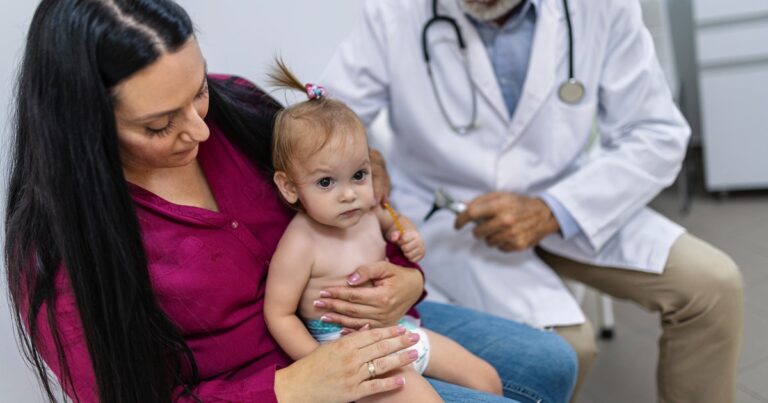
[ad_1]
Respiratory Syncytial Virus (RSV) is the leading cause of hospitalization in infants under a year old in the U.S. every year. And now, ahead of cold and flu season, the US Food and Drug Administration has approved a laboratory-made version of an antibody called nirsevimab, which works to protect newborns from RSV.
Nirsevimab, which will be sold under the generic name Beyfortus, is not a vaccine, though the drug is an injectable. Vaccines prompt the body to make antibodies to defend against pathogens. Instead, nirsevimab is a ready-made antibody that can bind to the virus and block it from infecting healthy cells.
FDA officials approved the drug based on three studies showing Beyfortus reduced the risk of RSV infection between 70% and 75% among infants and children 2 and younger.
The FDA also said that Beyfortus comes with a warning about extreme immune responses, such as anaphylaxis — severe or life-threatening allergic reactions — which have been observed with other monoclonal antibodies. The drug should, however, also “be given with caution to infants and children with clinically significant bleeding disorders.”
Nirsevimab is given as a single injection to an infant before RSV season — which usually peaks in the fall and winter months. The FDA approval also allows a second injection for infants up to 24 months of age who remain vulnerable through their second RSV season.
“Today’s approval addresses the great need for products to help reduce the impact of RSV disease on children, families and the health care system,” Farley said in a news release.
Beyfortus, which will be marketed in the U.S. by Sanofi, is already approved in Canada, Europe and the U.K. hhe U.S. price of the treatment has yet to be determined.
Though approved by the FDA, the US Centers for Disease Control and Prevention (CDC) still need to weigh in on its recommendations. The Advisory Committee on Immunization Practices has issued draft recommendations and clinical considerations for nirsevimab’s use, but the group is expected to nail down more concrete guidelines with a vote at its next meeting.
After the CDC signs off, nirsevimab will become the second antibody available to protect young children against RSV.
The other, called palivizumab, has been used only to protect babies born prematurely who are younger than six months. It lasts only a short time in the body, so doctors give it once a month, starting just before RSV season, until the risk has passed.
Older adults and babies under 6 months old are particularly susceptible to severe RSV. The virus causes up to 80,000 hospitalizations per year.
RSV infection rates typically rise in the fall and peak in the winter, but last year’s brutal RSV season resulted in a dramatic spike in severe illnesses that overwhelmed several children’s hospitals. It started in June and peaked in November.
There’s also Pfizer’s maternal RSV vaccine for pregnant mothers, but the FDA has not approved the shot yet. Two RSV vaccines for older adults, one from Pfizer and another from GSK, have gone on to receive the agency’s approval.
[ad_2]